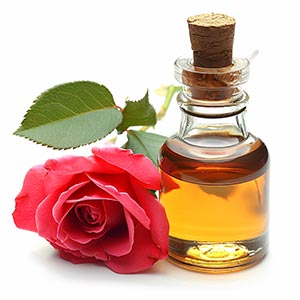Rose Oil or Rose Essential Oil, derived from the petals of various species of roses, has a long and cherished history in perfumery. It is one of the most revered and luxurious ingredients, used since ancient times. The process of extracting rose oil is meticulous and yields a highly concentrated fragrance. In perfumery, Rose Oil is celebrated for its rich, floral aroma that is both sweet and slightly spicy. It is a versatile ingredient, blending well with a variety of other scents, and is often used as a heart note in many fragrance compositions. The scent of Rose Oil is not just limited to its beautiful aroma; it also plays a crucial role in the emotional appeal of a fragrance. It is associated with feelings of love and romance, making it a popular choice in many classic and modern perfumes.
Natural or Synthetic?
Natural Rose Oil, extracted from rose petals, is highly valued for its authentic and rich fragrance. However, due to its high cost and the large quantity of roses required for extraction, synthetic alternatives are often used. These synthetic versions are more cost-effective and allow for consistent scent quality. The choice between natural and synthetic Rose Oil in perfumery depends on the perfumer's preference, the brand's formulation policy, and budget considerations.
Fragrance Families Rose Oil Most Commonly Found In
Show fragrances that contain Rose Oil as a note


